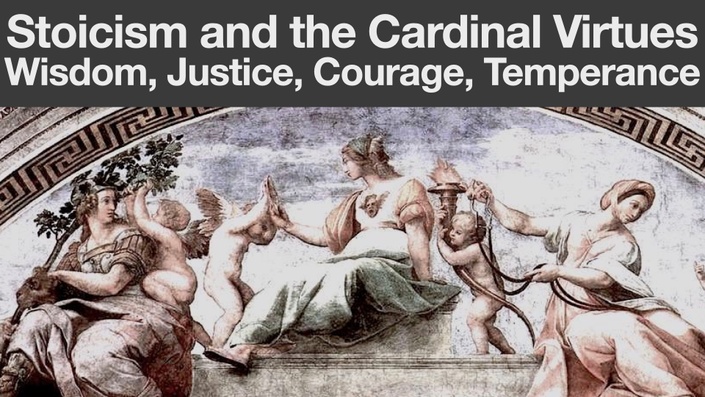
Stoicism and the Cardinal Virtues: Wisdom, Justice, Courage, and Temperance (6 Week Course)
Take a deep dive with an expert guide into study of an absolutely central feature of Stoicism, VIRTUE! We'll study Stoic teachings about the four cardinal virtues of wisdom, justice, courage, & temperance, and how to build them in yourself
Watch Promo Enroll in CourseGet started now!
Join us for a 6-week intensive study in Stoic Ethics. We will be examining an absolutely central, but also complex notion, that of virtue and the virtues. What is virtue? How do we acquire, develop, and apply it? How does virtue in general break down into the four cardinal virtues of wisdom, justice, courage, and temperance, and what does each of these virtues include, involve, and require? Is the Stoic viewpoint on virtue and the virtues a coherent one, and can criticisms of it be addressed from a Stoic perspective?
Enrolling in this class means you get to systematically study what Seneca, Cicero, Musonius Rufus, Epictetus, Marcus Aurelius and other key writers have to say about the Stoic understanding of the virtues with an expert guide who has been studying, teaching, and writing about these topics for over a decade!
Tuition for the course includes the class sessions, access to discussion forums, downloadable handouts and worksheets, and other useful resources.
The course meets weekly on Saturdays, at 10:00 AM Central Time, starting on February 24. All of the course sessions will be recorded so students can review them at their leisure, and as many times as they would like.
We will be studying, exploring, discussing, and applying important and useful ideas drawn from the course texts. Key ideas students will develop a solid understanding of questions, problems, and issues that include:
- Why Stoicism is sometimes explained as the view that virtue is the only genuine good
- How the Stoics understood virtue and its opposite, vice, in general
- Why there are four cardinal virtues according to the Stoics
- How the virtues make a person good and how the vices make a person bad
- What the cardinal virtue of wisdom is, and what its component virtues are
- What the cardinal virtue of justice is, and what its component virtues are
- How kindness or beneficence is an integral part of justice for Stoics
- What the cardinal virtue of courage is, and what its component virtues are
- What the cardinal virtue of temperance is, and what its component virtues are
- Criticisms made of the Stoic position on virtue, and Stoic defenses or explanations of that position
- How we can progressively build these virtues within our lives, characters, and relationships
Philosophy classics always intimidated me. I couldn't follow a lot of it, and I did not get much out of reading. When I went to study with Dr. Greg Sadler, he helped me read the works in pieces while helping me understand. The best part is, h encouraged me to think about how some of these ancient ideas could be applied into my own life. I found him very personable, and kind. Absolutely fantastic mentor! - Scott Tarulli
"Studying philosophy is rewarding but can also be challenging and lonely. Dr Sadler makes classical and modern texts approachable and accessible, while his classes bring me into conversation with fellow learners. His teaching has not only given me intellectual understanding but also a better appreciation for how I can put philosophy into practice." - Marc Smit
Your Instructor
After a successful career as a college professor, researcher, and administrator, I started our company, ReasonIO (with my wife and partner, Andi Sciacca) in order to help people study and apply philosophy in public, practical, and professional contexts. I continue teaching philosophy, literature, religious studies, and humanities courses at the Milwaukee Institute of Art and Design.
I take difficult philosophical texts, thinkers, and topics, and make them accessible for everyday people. That's how philosophy gets traction and remains closely connected with real life! The work I do with ReasonIO includes online course development and teaching, public speaking, organizational and ethics consulting, tutorial sessions, development of philosophy content, and philosophical counseling.
My work and expertise covers a wide range of topics, thinkers, and texts in western philosophy, ranging through ancient, medieval, modern, and late modern periods. Among the schools, movements, and traditions I draw upon are Platonism, Aristotelianism, Stoicism, Patristic and Medieval Christian thought, Dialectical thought, Existentialism, Critical Theory, and Philosophy as a Way of Life.
From 2016 to 2022, I served as the Editor of Stoicism Today. I remain a member of the Modern Stoicism, ltd. team. I am also the producer of the Half Hour Hegel series, which is nearing its completion. I have authored one book (Reason Fulfilled By Revelation), edited two volumes (Stoicism Today Selected Essays, volume 3 and volume 4), and published dozens of articles, book chapters, and encyclopedia entries. Although I work in significant part outside of the academy, I remain actively engaged in research and scholarship.
In recent years, I have held a Research Residency at the Institute for Saint Anselm Studies, been a Visiting Scholar position at European Graduate School, and was a Charles Chesnutt Library Fellow. I am also an APPA-certified Philosophical Counselor.
Course Curriculum
-
PreviewAbout The Class Recordings
-
StartZoom Link For Class Sessions
-
StartRecording of Class Session 1 - The Virtues In General
-
StartRecording of Class Session 2 - The Virtue Of Wisdom
-
StartRecording of Class Session 3 - The Virtue Of Justice
-
StartRecording Of Class Session 4 - The Virtue of Courage
-
StartRecording of Class Session 5 - The Virtue of Temperance
-
StartRecording of Class Session 6 - Issues with Stoicism and the Virtues
